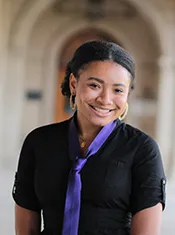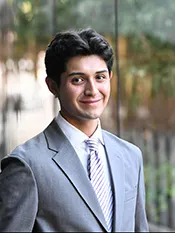Current Kling Fellows
Class of 2026

Ryan Altman
Majors: History and Political Science
Minors: Legal Studies
Project mentor: Timothy Parsons
Project title: “Becoming White: Holocaust Refugees, Race, and Empire in Northern Rhodesia”
Project description: Through the study of Holocaust refugees who escaped to Northern Rhodesia during WWII, Ryan seeks to expose how Jews were viewed as “White” or “European” in the British Empire, even if they were viewed as non-white in Europe. Through this, I aim to show the fallacy of the British Empire’s notion of race.

Sonal Churiwal
Majors: Women, Gender and Sexuality Studies and Political Science
Minor: Writing
Project mentor: Shefali Chandra
Project title: “Who Is ‘India’s Daughter’: Caste and Religion in Sexual Violence Reporting in India”
Project description: Since the turn of the century, India’s pervasive rape culture has been brought to national and even international headlines. Despite increasing coverage of sexual violence, however, most headlines center the violence of caste-privileged, Hindu women, overlooking the plight of Dalit, Muslim and otherwise marginalized women who sustain sexual violence at disproportionately higher rates. Moreover, condemnation of the astounding rate of sexual violence in India is often masked with thinly nationalist language, crying out for justice for “India’s daughter.” This begs the question, who can be India’s daughter? Sonal’s project analyzes caste and religious biases in Indian media’s coverage of sexual violence, seeking to understand how journalistic practices fuel selective outrage at the violation of relatively privileged women while maintaining silence about the violation of multiply marginalized women.

Halla Jones
Major: Art History and Archaeology
Minor: Women, Gender, and Sexuality Studies; African and African-American Studies
Project mentor: Rebecca Wanzo
Project title: “In Search of Our Mothers’ Gardens, We Found Our Own”
Project description: Halla’s project explores African American quilting traditions through a Black feminist lens. Seeking to answer the question proposed by Alice Walker — “How was the creativity of the Black woman kept alive, year after year and century after century, when for most of the years Black people have been in America, it was a punishable crime for a Black person to read or write?” — this project conducts a historical analysis of African American women’s use of quilting as a creative outlet and mode of self-expression.

Marissa Mathieson
Majors: American Culture Studies and Political Science
Minor: Psychology
Project mentor: Pamela Begay
Project title: “When Loss Becomes Adaptation: Rethinking Decline and Continuity in Indigenous Canoe Practices”
Project description: Marissa’s project challenges the assumption that cultural change signals cultural loss by analyzing how Indigenous communities strategically adapt, rather than simply lose, traditional practices in certain (but not all) circumstances. Predominantly using Samoa’s paopao canoe as a case study, as well as explorations of Navajo, Native Hawaiian and Maori traditions, she questions whether Indigenous cultural transformation is always a sign of disappearance or whether, at times, it can be a sovereign act of negotiating preservation and innovation.

Avery Melton-Meaux
Major: English Creative Writing with a concentration in poetry
Minor: Drama
Project mentor: Phillip Maciak
Project title: “Queering Connection: Nigerian Queer Poetry in the Twenty-First Century”
Project description: Avery’s project examines the emerging genre of queer Nigerian poetry in the 21st century, drawing on postcolonial, queer and formalist theories.

Emilio Parra-Garcia
Major: Women, Gender and Sexuality Studies (Health concentration)
Minor: Anthropology: Global Health and Environment
Project Mentor: Allison Reed
Project title: “Commons of Care: Online Spaces as Resistance for Queer Minorities with Eating Disorders”
Project description: Due to the lack of intersecting research, Emilio’s project seeks to integrate eating disorders into queer theory and disability studies. He is specifically looking at how queer minorities have found community, kinship and a possibility for recovery in online spaces, such as Reddit threads and Facebook support groups. These spaces serve as sites of radical resistance to social and clinical displacement. He is focusing on concepts such as feminist and queer commons, care work and glitch theory to ground his analysis.

Lauren Perkins
Major: History
Minor: Political Science
Project mentor: Zoe Ang
Project title: “Misplaced Hope or a Substantive Avenue for Change? Evaluating the Effectiveness of Co-ethnic Representation at the Local Level”
Project description: Lauren’s project aims to gauge the extent to which co-ethnic political leadership has translated into material benefits for African American constituents. She plans to explore this question through a case study of St. Louis’ first African American mayor, Freeman Bosley Jr., within the larger context of U.S. electoral politics as a means for Black social advancement.
Class of 2027

Astrid Burns
Major: American Culture Studies
Minors: English and Legal Studies
Astrid’s project explores the effects of the commodification of feminism in recent decades through an analysis of popular culture and social media sources, working to reconcile these changes with our legal institutions.

Ava Giere
Majors: English Literature and Political Science
Minor: Spanish
Ava’s project investigates how the love triangle trope in rom-com films and literature can also be a metaphor for the choice between rival political futures.

Sarah Johnston
Majors: English Literature and Anthropology
Minor: Spanish
Using feminist and postcolonial frameworks as tuning forks, Sarah’s project follows contemporary Irish women writers as they respond to and reconcile with Ireland’s deep literary tradition. Her research centers on how these authors, through writing in both the English and Irish languages and working across genres, transform the silences left by misogyny and colonialism into sites of cultural and linguistic reinvention.

Julia Li
Majors: Economics and English
Julia’s project explores how corporate finance, specifically private equity, utilizes rhetorical strategies to influence public perceptions of corporate identity and responsibility.

Kevin Ramirez
Majors: Comparative Literature and Women, Gender and Sexuality Studies
Kevin’s project provides a psychoanalytic reading of how the gay signifier functions as a fantasy of authenticity within the postmodern condition, tracing how desire itself is structured and circulated within discourse.

Deborah Theophile
Major: Cognitive Neuroscience
Minors: Music and Anthropology
Music therapy is defined as an approach that uses music interventions to address the physical, emotional, cognitive and social needs of individuals. However, the perspectives of diverse racial and ethnic groups, as well as individuals with disabilities, are often underrepresented in these practices. Through questions such as “How do music therapy programs describe and categorize disability?” and “Does the practice of music therapy reinforce ableist or racialized narratives?” Deborah’s project investigates the impact of music therapy on individuals with disabilities and those from diverse racial and ethnic backgrounds.